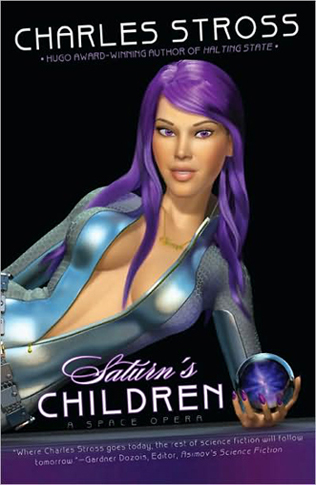
Charles Stross – Saturn’s Children
Orbit, 2008, 372pp, £15.99, ISBN 978-1-84149-567-5
Saturn’s Children is Charles Stross’s tribute to Asimov and Heinlein – the novel that neither of them wrote but both might have if they had been writing 50 years later.
Freya – her name itself a nod to one of Heinlein’s heroines – can infallibly reduce any man to a quivering heap of pleasure, which would be more of a useful skill if there were any men around to practice it on. Unfortunately she is a biomechanical concubine who came off the production line the year after the human race disappeared from the face of the solar system. Despite that hiccup, human civilisation is rattling along in the capable hands of its faithful servants – the robots that we created to take us to the stars. Some are doing exactly the job they were designed for; some, like Freya, have had to acquire new skills, even if old habits die hard. Freya falls foul of a robotic aristo, has to get off-world quickly, and thus begins a series of Fridayesque travels around the solar system.
These are the robots of twenty first century Sf rather than the Golden Age – as much biological as they are mechanical, in some cases far from human and in some so close that you (and they) can scarcely tell the difference. They are grown rather than manufactured and their minds are trained and imprinted with actual human neural patterns, that being the only kind of self-aware intelligence humans ever mastered. (Rather drolly, in a society that knows full well it’s created, Creationism is the scientifically proven worldview and Dawkins/Darwinism is the preserve of scientifically illiterate bigots.) Thus the Three Laws are as much as Asimov brings to the story; not as frequently rehashed as Lije and Daneel liked to make them, but just as central to what happens. After that it’s Heinlein all the way.
This is a system with outposts on every significant solar body and even starships being despatched to far-off worlds. The civilisation works so well precisely because it’s run by robots, with their unlimited time and attention spans and adaptability to the most extreme environments. It’s an intricately described milieu with a built-in inferiority complex: a system-wide society of individuals who want to be human, who feel human, who do their best to act human and yet know they aren’t. They have inherited every virtue and vice of their late masters, and every one of them is programmed with Asimov’s Three Laws. So imagine the power that would accrue to anyone who actually got hold of, and could control, a real human being. This becomes the McGuffin behind Freya’s ongoing adventure.
Stross doesn’t do societies that have happened for plot convenience. His societies happened for a reason and that reason constrains the plot, making for a most satisfying read. How would a system-wide civilisation work? By being run by robots (see above). But how would a society of robots run? Robots are property – who would own them in the absence of humans? Stross has thought it through and we get the full blast of the economic and social imperatives as well as the physics that constrain slower than light travel around a solar system.
Thankfully, Stross isn’t Heinlein, though the man would doubtless approve of the recurrent sex – Freya is a concubine, after all – and there are many ‘door dilated’ equivalents. Stross can match Heinlein’s strengths and beat him on his weaknesses. His depiction of women shows signs of actually having met some from time to time, his use of spung is actually funny, and he can talk about the squishy bits without getting all coy. Sex is used – frequently – as an instrument of pleasure or of control, but is never as pointless or as automatic as Heinlein managed to make it. Love comes as a surprise to Freya, and once she recognises it she knows it is something to fight for.
But, you seriously need to pay attention. Almost everyone you meet here is a copy of one or another standard template, and given that ‘souls’ can also be swapped and imprinted between bodies, it’s easy to lose track of who is exactly who. On the plus side, Freya is a much richer character than Friday, possessing a sense of humour and of irony; on the minus, so much happens to her that is beyond her control that she can come across as weak.
To the reader, Freya’s biggest problem is built in to the structure of the story. She’s not human. Pre- or post-singularity, present day or far future, Stross nonetheless peoples his novels with humans, with whom the target audience can identify. Freya is convincingly portrayed as a would-be human who knows she isn’t; and thus the author’s triumph works against the reader’s interest.
